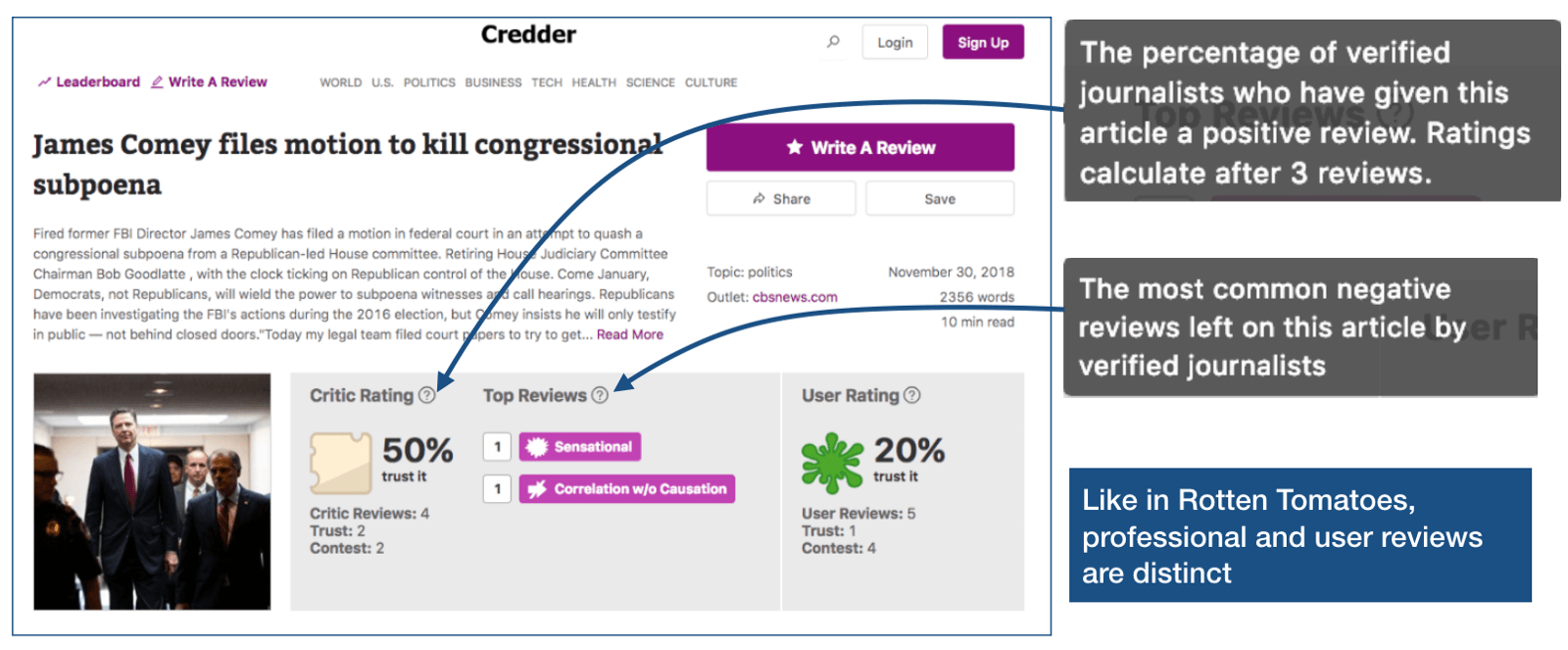Do you trust the media? Most people don’t. A 2017 study of nine Western countries found that in not one did a majority of people think traditional news or social media sorted fact from fiction well. Trust in media has been falling since the 1970s, and particularly in the last few years, as alternative media challenged mainstream narratives and companies like Facebook and Google AdSense deprived traditional media of advertising income.

Fake news is not reserved only for low-quality, clickbait websites. Some 72 percent of Americans agree that traditional media consistently report stories they know to be false or purposefully misleading for political or financial gain. Even some of the most trusted news outlets like the BBC have told their staff to “emulate Buzzfeed” in producing viral, clickbait-y articles and videos. Can this terminal decline in quality and accuracy be halted? Or is the future of media more “junk food news,” as Project Censored’s Mickey Huff fears?
“Like Yelp, but for news”
Credder, a website and browser extension launched this week, aims to spark a revolution in high-quality journalism and a crowd-sourced fight-back against fake news. Credder is a news aggregation service where users can view and rate news and opinion articles for their accuracy and credibility. The aggregate score is displayed to inform readers of the community’s judgment on articles, websites and individual journalists. Both users and verified journalists can rate any article from sites that have agreed to be ranked on the platform.

Credder was founded by three news junkies: Jared Fesler, Austin Walter and Chase Palmieri. Mint Press News spoke to Palmieri, who told us the idea was born out of his experience in the restaurant industry:
I saw how when Yelp came in to the restaurant space it really changed the behavior of restaurant owners; customers holding restaurants accountable drastically changed their behavior and allowed a smaller restaurant like ours to win, because now we had an online reputation and were competing on the quality of the experience.”
As news consumers, the three saw the rise of sensationalism and clickbait and realized, given the advertising model of the mainstream media, the problem would soon become the norm. Palmieri said that at that time:
The only solutions being proposed were Google or Facebook censoring on our behalf or some AI for news that would come save the day. Ultimately, all the proposed solutions were about outsourcing our critical thinking skills. So we thought ‘what if there was a Yelp for news, connecting news consumers?’”
Since then, the three have spent two years working to get to the point where they were ready to launch the platform. Just as Yelp promotes and highlights the highest-rated restaurants in a location, Credder displays and encourages the most trustworthy and highest-quality articles while penalizing low-quality clickbait and fake news, regardless of what website it is hosted on. Thus, Chase hopes, it will “make news compete for trust instead of clicks, and then we will drive traffic to the most trusted sources.”
This could be a boon for smaller, independent media and even solo bloggers who struggle to compete with the massive reach and power of the mainstream press, by helping them develop a reputation for good journalism and compete, just as Yelp helps mom-and-pop restaurants compete against the big chains. If you think your blog or website can go toe-to-toe with the big boys in terms of quality and accuracy, then Credder might help you.
Mickey Huff — who, in addition to his leadership of Project Censored, is president of the Media Freedom Foundation and a critical media literacy expert — told Mint Press News:
Credder’s idea warrants experimentation and deserves a fair run in order to see if in fact it can produce the outcome that the team hopes for, building credibility on their platform for those journalists who are doing truthful, transparently-sourced, factual news stories.”
Palmieri pitches Credder as an alternative to the “whack-a-mole censorship” that Google, Facebook and Twitter have implemented in response to the crisis — which has primarily hit alternative media and promoted corporate media, regardless of its quality — and the “top-down” and “poorly nuanced” approach of its competitors.
NewsGuard: your friendly fact checker (run by the CIA)
Here Palmieri is diplomatically referring to NewsGuard, a browser extension launched last year to great fanfare in the mainstream press. NewsGuard also claims to fight online fake news by using a traffic-light system, judging outlets to be either credible (green) or untrustworthy (red). Reliable outlets receive a green shield next to their links while fake news comes with a red warning symbol.
Unlike Credder’s, these judgments are decided by NewsGuard’s own private team of “trained analysts” who deem Fox News and virtually the entire corporate media as trustworthy. Meanwhile many alternative media outlets are tarred with a red warning symbol. After publishing an exposé of the company, Mint Press News was deemed “untrustworthy” by NewsGuard. Thus, NewsGuard’s ratings are exactly what one would expect when examining the group’s advisory board, which is a who’s-who of high state officials, including:
- Tom Ridge, First Secretary of Homeland Security under George W. Bush
- Richard Stengel, Under Secretary of State for Public Diplomacy under Obama
- Don Baer, former White House Communications Director
- Anders Fogh Rasmussen, ex-Secretary General of NATO
- General Michael Hayden, former director of the CIA and NSA.
When people like this are deciding for Americans what is true and what is false, what is real and what is fake news, it is state censorship by any other name. At a panel discussion about combating fake news at the Council on Foreign Relations in May 2018, Stengel described himself as the State Department’s “chief propagandist” and explicitly advocated the use of propaganda on American citizens. Worse still, NewsGuard is also linked to a PR agency employed in whitewashing the Saudi government’s human-rights record and its role in the Yemen genocide.
“It is so cynical, it is like putting Henry Kissinger in charge of the 9/11 Commission,” Huff said of NewsGuard. “There’s a lot of chicanery behind the scenes and not a lot of transparency; …it reeks of dishonesty.”
NewsGuard has partnered with Microsoft and the extension is built into Microsoft Edge, the tech giant’s browser on iOS and Android devices. The company is lobbying government agencies to install it as standard in public libraries, schools and universities as well as all smartphones and computers sold in the United States. Hawaii recently became the first state to install it on its computers at public libraries.
Palmieri distances his new product from Microsoft’s anointed entry in the field, explaining:
Where NewsGuard gets it wrong is that they are trying to build a trusted solution for news consumers without letting news consumers participate. Credder takes a bottom-up approach.”
He explains that he and his colleagues are trying to level the playing field:
Before Yelp, people would go get breakfast at IHOP or Denny’s or McDonald’s because they knew what they were going to get. It wasn’t until these mom-and-pop restaurants had an online reputation through Yelp that it became less risky for restaurant goers to spend their money at the smaller, independent restaurants. Some of the busiest restaurants in any city are the small, independent ones, and they can compete with the marketing and name recognition of IHOP or Denny’s because now they have a reputation people can see online. And that’s what we are trying to create for independent authors and outlets.”
Troubles ahead?
There are certainly many hurdles to overcome to become the Yelp of news. For one, the problem of bad-faith reviews and gangs of trolls that has dogged similar rating sites. For instance, anti-feminists mass-downvoted the latest all-female Ghostbusters movie on Rotten Tomatoes and IMDB.com. Credder’s reviewers consist of both verified journalists and users who are encouraged to optionally verify their identity to improve their own rater’s credibility score. Users can rank only articles, and not websites or individual journalists, which could reduce dishonest reviews. Furthermore, the community can upvote or downvote reviewers’ evaluations as well, meaning bad-faith reviewers’ opinions will carry less weight in the algorithm. Credder’s team hopes these measures will dissuade such bad behavior, but that remains to be seen.
Breaking even will pose another challenge, and Palmieri calculates he will need 10,000 users to achieve a critical mass and make the project viable. His plan to make money is to “become the Patreon for news media,” enabling users to tip their favorite outlets or journalists directly and taking a cut of the transaction. Sponsored articles from outlets or individuals, allowing people to share their work with targeted audiences with whom they believe it would resonate is also an option, although these articles will then be at the mercy of the user base, and rise or fall accordingly, encouraging sponsors to promote only their highest quality work.
“One of the main challenges is just getting it out there in terms of visibility and getting people on the platform and using it so they can see how effective it can be,” said Huff, who is also Professor of Social Science at Diablo Valley College and has advised Palmieri:
Reaching a critical mass and breaking through the noise is going to be their biggest test. But Credder is first on the scene in terms of crowd-contested media and they have really been working out the bugs on it for the last couple of years.”
In this brave new online world, there is a pressing need for more critical media literacy. With disinformation all around us the battle for the means of communication rages silently in cyberspace. Credder hopes to be a player in this fight. But whether the restaurateurs have served up a Yelp for news remains to be seen.
Feature photo | Credit | Shuttershock
Alan MacLeod is an academic and writer for Fairness and Accuracy in Reporting. His book, Bad News From Venezuela: Twenty Years of Fake News and Misreporting was published in April.


